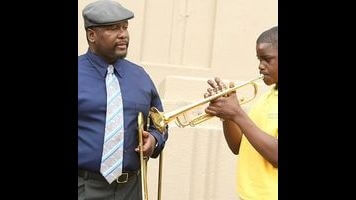Treme: "Right Place, Wrong Time"

Last thing’s first: In an otherwise stellar episode, the final scene of tonight’s Treme, where a busload of tourists intrudes on a ritual to honor one of Katrina’s tragically neglected, sticks in my craw a bit. Arriving right on the heels of last week’s subplot about the freshly scrubbed, out-of-place Wisconsinites and their odyssey through “real New Orleans,” I’m worried the show has gone beyond merely reflecting the prickly attitudes of some NOLA natives and adopted them itself. That’s not to say those attitudes are unfounded: The intrusion of photo-snapping tourists on a scene of that gravity borders on the obscene—something the driver eventually acknowledges—and the neglect shown to the city before and after Katrina was something worse. And, of course, there are negative consequences to having outsiders descend on the city that Treme does address, must address, and addresses with a lot of insight.
At the same time, I think the show could stand to be a bit more charitable to outsiders. It’s a natural impulse for people to bear witness to tragedy. It’s also natural for them to show compassion and help where they can, even if they cannot begin to fathom what makes this great and ornery city tick. (And perhaps unwittingly piss off the locals as a result.) Great as David Simon’s series have all been, Treme underlines his weakness for painting those outside the show’s generously considered inner circle with too broad and too contemptuous a brush. And make no mistake: As viewers, we’re very much on the outside here. There are times when I worry I’m simply not cool enough to hang out with Treme. It gets mad when I neglect it, but it isn’t happy with my interest, either. Because no matter how hard you try, you’re never gonna be New Orleans enough for it. (The New Yorker’s Nancy Franklin puts it more succinctly: “The series virtually prohibits you from loving it, while asking you to value it.”)
Nevertheless, the last scene in “Right Place, Wrong Time” follows through on a theme that carries over from the rest of the hour: Anger. Anger at the insurance companies holding back payments. Anger at a police system so distressed, corrupt, and incompetent that it’s not even interested in the identity of a man it’s holding. Anger at the heavy-handedness of National Guard members. Anger over a flood victim left to decompose for months in his garage. And anger in more personal arenas, like Desiree’s fury over Antoine’s blatant promiscuity, adding insult to the injuries caused by his failure to provide. Or LaDonna’s continued frustration over all and sundry: Her brother’s disappearance into the prison bureaucracy, her mother’s bullheaded refusal to leave New Orleans to stay with family in Baton Rouge, the arrogance and provincialism of her husband’s family, and those goddamned workers who can’t get the roof fix done. (Khandi Alexander, who I confess to knowing mainly from NewsRadio, has been a revelation in this series, funny and fierce. This episode was a great showcase for her range.)
Elsewhere, several of the show’s more roguish men pay a price for going against the current. Davis and Antoine both need Toni to bail them out of the pen for agitating the authorities: Davis for telling National Guardsmen in the neighborhood to “go the fuck back to Fallujah” and Antoine for the lesser charge of drunkenly scraping a police car with his trombone. (Sidenote: How glorious was the scene right before Antoine gets arrested, when he lends vocals to an impromptu street number with buskers Sonny and Annie? Infectious scenes like that make me love Treme, even when it pushes me away.) Wendell Pierce makes Antoine enormously likable despite his weakness for loose women and a pride that’s often self-destructive, particularly when it comes to providing for the people who depend on him. It’s telling that much more viewer animus has been directed at Steve Zahn’s Davis, whose insecurity and self-righteousness (and, okay, obnoxiousness) mask the sweet soul of a man willing to blow an entire paycheck on the woman he loves (and barely tolerates him).
And speaking of viewer animus, it seems like Sonny is starting to absorb the bulk of it now that he’s become a major player on the show. This is only fair: He’s kind of a prick and not a terribly charismatic one at that. But the gesture of him buying a bottle of wine for Annie was a lot like Davis’ night out with Janette; he’s throwing everything he’s got at a woman who’s mostly frustrated by him and who’s passing him by. Watching Annie fiddle her way through some bourgeois party was aggravating to Sonny on so many levels—his exclusion, the one-night-only dissolution of their partnership, her collaboration with a musician of note, the elitist crowd treating them as background noise—that his restraint from making a scene has to be counted as semi-heroic.









![HBO teases new Euphoria, Larry David, and much more in 2026 sizzle reel [Updated]](https://img.pastemagazine.com/wp-content/avuploads/2025/12/12100344/MixCollage-12-Dec-2025-09-56-AM-9137.jpg)






























